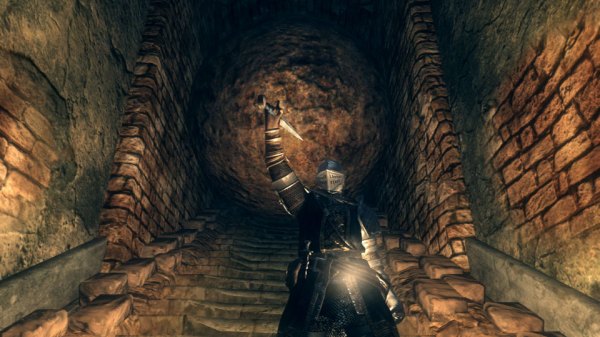Dark Souls III has been unleashed upon its hollowed fans, and with this new entry comes a new perspective that comes only with time. We could look at Dark Souls, but the true story goes much farther back than that. However, the simple factors behind any Souls game boil down to three basic -concepts: the history, the world, and the gameplay.
The History
Dark Souls wasn’t the first Souls game; as a matter of fact, it was a result of built-up spiritual succession that continues to this day. The series really started all the way back with the King’s Field series, which began on the PlayStation and trooped on until 2001. Although fans of King’s Field games tended to be those who played it for Dungeons & Dragons experience, some detractors called the series ‘too slow’ at best.

The director of the series, Hidetaka Miyazaki, wanted to continue the series into the seventh gaming generation but eventually decided to begin the current tradition of making it a ‘spiritual successor’ - a game with many of the same elements, characters, and ideas, but with different specific details. This new game was Demon’s Souls, a smash hit for the time.
From Demon’s Souls, and born out of legal issues with Sony over ownership of the I.P., came Dark Souls, the first major breakthrough that exposed the mainstream audience as a whole to the idea of masochism. Dark Souls was a combination of many of FromSoftware’s past games, even drawing from their Armored Core series. The sales numbers of the game had been consistently growing ever since the release date, prompting efforts for a sequel.
Thus came Dark Souls II. It received critical acclaim that was similar to the first game, as well as very similar sales figures. However, the community was devastated to learn that Miyazaki had minimal involvement with the game, having instead shifted focus toward working on the PlayStation 4 exclusive Bloodborne.
Bloodborne is the most recent iteration of the spiritual tradition, with many of the same mechanics used throughout the Souls games. Now as we wait with bated breath to see if Dark Souls III is going to just as good as we hope it is, let’s take a look at the world.
The World
In interviews, Miyazaki has mentioned that his childhood was filled with English adventure novels with heroes bold, dragons old, and kingdoms fallen. He mentioned that he read them in their original English forms, going through them as fast as he could. However, having grown up in Japan, he had limited abilities to understand the entire story. So, he did the only thing he could: he imagined what happened next.
This design philosophy is shown throughout the games, as every single clue, every single item and every idle word cast from unsuspecting lips meant something to that character, whether you picked it up or not. Every small, intricate facet from everything to the monsters that you face, to the areas that you go; from the people that you encounter on your quest, to the great beasts you conquer with ceaseless might and cunning swift.

Credit: Wikidot
This permeates every single section of the game, making every single thing in the game have a complete backstory that means something rather than nothing at all. This resulted in Dark Souls’ well-known insane laughter that every character ends his or her dialogue with, creating an atmosphere where everyone knows that their life is a joke. They despair at their dying world, mourning hysterically like the Joker with his lost sanity.
Not to mention that fan theories about the game have run rampant with speculation, creating a dense community of intelligent people who do their research on the game before doing anything else. People make theories, change them and reform them, all in reaction to other people’s thoughts. The game attracts those who desire a complete story: the puzzle-solvers, detail-finders and dialogue-decryptors. They’ll help you just as you’ll help them through this lonely journey you’ve set upon.
The Gameplay
Now, the main thing that so many people are attracted to is the gameplay. It’s a well-known fact that anyone remotely close to gaming’s cultural influence is aware of - Souls games are hard. Like, throw your controller against the wall hard while gritting your teeth so much that they turn into dust hard. It’s almost not even classified as a Souls game without the difficulty.
The basic idea of gameplay focuses around combat as the standard either/or choice: you can either have less armor and more mobility, or more armor with less mobility. This is the effective quandary that drives the game, delving into every single moment, every choice you make from the long-term, “Which stat should I upgrade?” to the much more split-second, “Should I roll here?”

Credit: Dark Souls Project
When it comes to that split-second, the controls are usually tighter than the buttocks of the dragon that you are usually forced to stab repeatedly. The game makes sure to know that when you die in this realm, it is nobody’s fault but your own… about 99% of the time. There’s always going to be that minute glitch or hiccup here or there that makes you die.
But every single other time, you’re going to be frustrated with yourself and not the game, because the game tells you one way or another what’s going on; you have to pay attention and react accordingly. One of the most frustrating areas of Dark Souls, Sen’s Fortress, is filled with traps that you often fall for the first time. But as you die in increasingly frustrating ways, you eventually see the panel that triggers the arrows in the slit behind the wall, or the switch that sends a boulder coming toward you, Indiana Jones-style.
As you progress through the challenges set before you, you learn the small subtleties of this or that move set of a weapon, or a boss’ repeating patterns, or even stat bonuses that only stack up with certain combinations. You become a master of the game set before you, and by the end of the experience, you feel as though you’ve actually achieved something.
Miyazaki has actually stated that the difficulty of the series wasn’t intended; rather, he just wanted to make the game feel as though the player accomplished something by the end. And that’s exactly what he’s done himself in creating these worlds to explore. In a way, he just wants to make the player feel just as he does, the game just being the medium of empathy. I’d say he succeeded.





